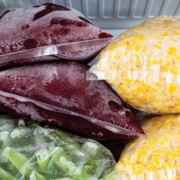Do this to save fresh local produce for a year!
– Third in a 3-part series on storing fresh local produce
– By Kristin Henderson, chief veggie conversationalist:
(Part 1: You won’t believe how much nutritional value is lost)
(Part 2: 4 easy ways to max out your produce’s nutritional value)
In the last two posts, we got into some of the ways Seasonal Roots’ small family farmers are bucking the trends that are killing the nutritional value of modern-day produce… and four easy ways you can max out the nutritional value of the nutritious, delicious produce our local farmers grow. But what do you do if you find yourself with too much of it on hand?
To save fresh local produce from going to waste, freeze it. It will keep in the freezer for 8-12 months! Or can it. Where refrigeration just slows down that ticking clock of deterioration, freezing and canning both stop it cold. The remaining nutrients and flavor stay put until you’re good and ready to eat it.
Freezing requires no special gear, and it’s quick and easy. I’m all for quick and easy, so let’s focus on freezing.
1. To save fresh local produce, start with produce that’s as fresh as possible and in good condition.
2. Clean it thoroughly.
3. Boil water and either drop the produce directly into the water or steam it. Whether boiling or steaming, do this for 2-5 minutes until they’re just done.
4. From there, drop the produce into ice water. This process, called “blanching”, stops the enzyme activity that destroys nutrients and changes texture.
5. Let the produce cool, then put it into plastic freezer bags, squeezing out the air as you seal it up. Or, to keep all that produce from freezing into one big solid unwieldy block, pat it dry, spread it out in a single layer on a cookie sheet, and place the cookie sheet in the freezer. Once the individual pieces are frozen, pop them into bags. When you’re ready to use them, you can pull out a handful if that’s all you need.
Heat does cause nutrient loss, and both freezing and canning expose the produce to heat. But in most cases, you don’t lose any more than you would from cooking. And if you freeze it right away before those nutrients have a chance to slip away, you’ll generally lose less than you would if you let it sit in the fridge for a couple weeks, even if you ate it uncooked at that point.
So freezing makes it possible for you to enjoy delicious, nutritious meals made from fresh, local produce… in the off-season. Bonus!
For a deeper dive, here’s an article from the University of California at Davis, that compares how much nutritional value is lost during refrigerated storage and cooking versus freezing and canning.
Here’s a more detailed how-to on freezing from Mother Earth News.
And to REALLY get down in the weeds, the National Center for Home Food Preservation lets you look up how to freeze almost anything.
Photo from Dreamstime/Mother Earth News
